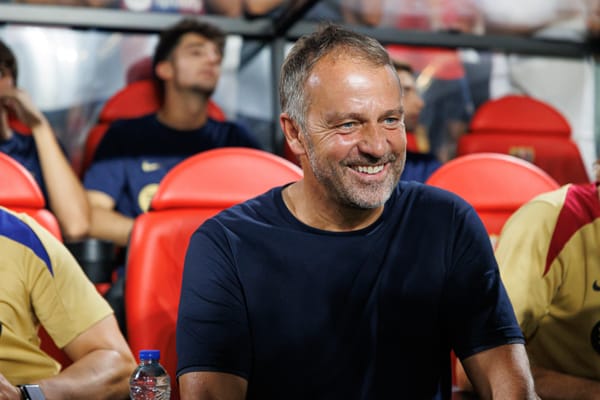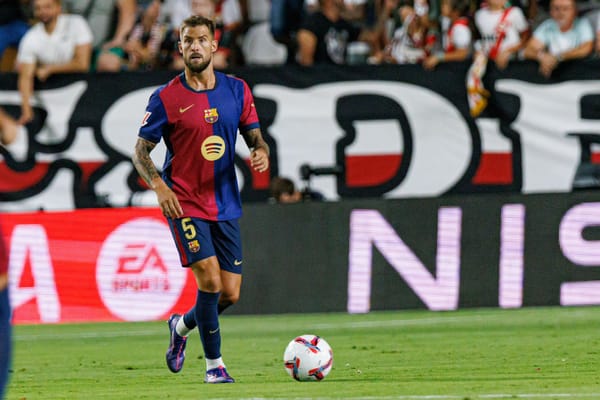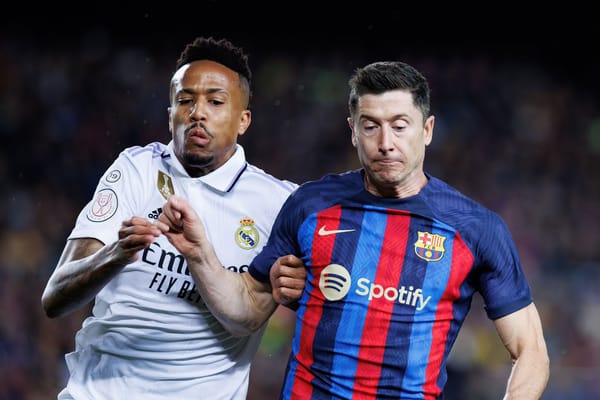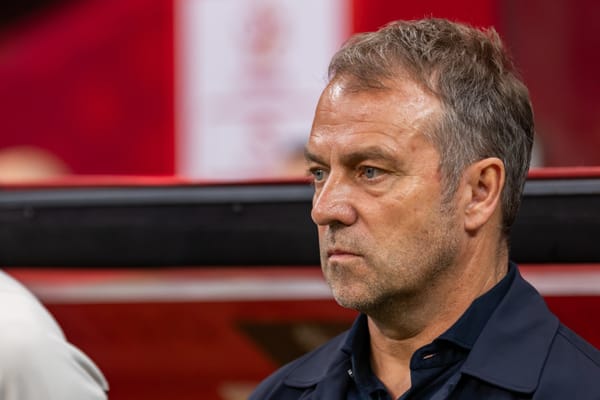Xavi leaves the building
Xavier Hernández Creus has left the building. Or to be precise, is about to, in a few months.
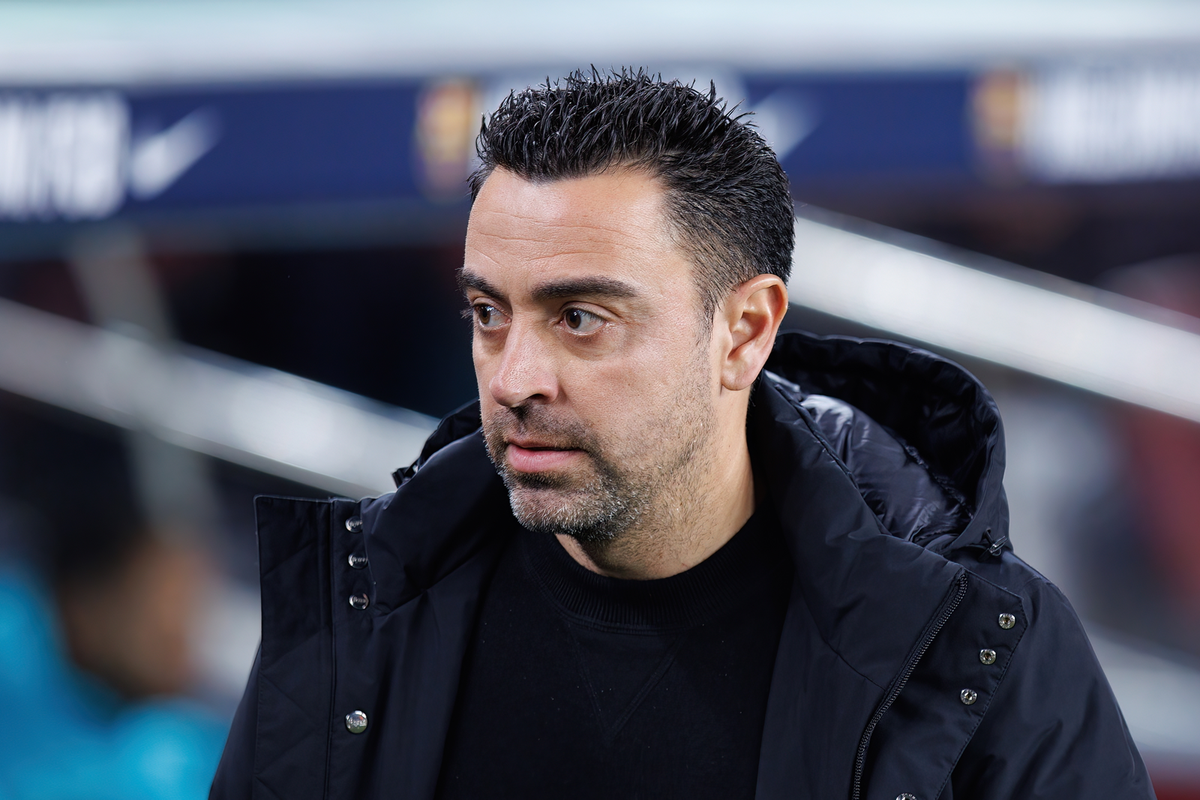
Xavier Hernández Creus has left the building. Or to be precise, is about to, in a few months. There is caution in that sentiment though, because it might be earlier than that if Barca continue to play like this, or this, or this, or this. That would make a top-four finish nigh impossible, adding more drama to the entorno that seems to engulf the club in perpetuity.
We love our legends. Our heroes. And we often burden them with our own expectations. We want them to come in impossible circumstances to save us and ride into the golden sunset amid cheers and waving flags. That is why legends and heroes are so feted in human culture. They can sometimes help us live our expectations vicariously. Give us an escape to win, to do the impossible without doing it ourselves.
Nurture and nourish our core tribal instincts.
Xavi Hernandez is such a legend. At least for the Barcelona fan base. A player of the Barca golden generation who won it all and in the process intertwined his history with that of the club.
There was not a single Barca fan who did not want Xavi to succeed when he answered Laporta's call to take the manager's seat at Camp Nou. Sure, there were some raised eyebrows at his apparent lack of coaching experience, but on the surface, everyone wanted to dream that he would return Barca to the ghost of 2009.
And yet here we are two years later, the manager himself admitting that it is "impossible to coach Barca."
So the main question is how did it come to this? At least that's what we as fans are most keen to make sense of. Per human psychology, our first reaction is to find meaning in something that goes wrong by assigning blame. It helps us rationalise expectations with reality.
But what if the real question is "Was it supposed to be any different"?
Let's rewind the clock a bit. Xavi had refused to accept the same role of coaching Barca a year before he actually accepted it, citing a lack of experience and timing. Most of the fan base agreed with his decision. So what happened in that one year which helped him change his decision? Did he gain the requisite experience in 12 months?
I guess the answer comes to another "legend" from the Ghost of 2009, winning the Barca elections. The man credited with crafting Barca's most successful period of history in terms of economics, branding and sporting excellence.
Joan Laporta.
But maybe there is a bit more nuance to this. Laporta in his entire campaign, which was mostly of atypical hubris, had never really endorsed Xavi as his candidate to coach Barca. Hushed murmurs rather suggested that "Presi" was more inclined to bring the German school of football to Camp Nou. It was also telling because, in the run-up to the same election, the man who had actively endorsed Xavi in every speech to return Barca to its erstwhile glory was Victor Font, a challenger to Laporta's claim to Presidency.
Common sense would suggest Laporta would look at anyone except Xavi to lead the bench.
So what happened in one year that made Xavi agree to take a role he was not ready to (just a few months back) and made Laporta agree to accept a person who had actively campaigned for another Presidential candidate?
Like most decisions, there is no simple answer to this and nothing that is documented or verified, but common sense might suggest a few scenarios. By the time Laporta strode into office for the second time, Barca's financial situation on a terrifyingly bloated wage bill, lack of European silverware and losses from Covid was frightening. For a person entrusted with the job of saving the institution, reducing Barca's wage bill, bringing back fiscal profitability, complying with FFP, repaying other clubs on payments not made with respect to player transfers and re-constructing a fading, crumbling Camp Nou, the margins of flexibility were exceedingly small.
Priorities needed to be redefined.
The first order of the day was to bring down expenditure over income. Thus started a roster cleanse, because the first place where "management" looks to cut costs is headcount. This is ongoing even today but it's very hard to move on from an exceedingly profitable and successful period, keep a team relevant, phase out ageing "legends" and bring in new players who can at least keep the team competitive.
Over the past five seasons, more than 100 players have left Barca, replaced by players arriving on cut-price deals, Bosman deals, La Masia starlets and legends from other clubs taking their last pit stop before fading into the glorious Spanish sunset.
In a situation like this, when you are leading a club that has a billion dollars in debt and i forced you to jettison some of the most iconic players that built the brand to save costs and align to sporting reality (Barca's last CL win was 2014/15 even with Messi being there till 2020 and let's not forget the 8-2 vs Bayern), you need to restore the fanbase through hope. You need a face that the fans can relate to, tickle their nostalgia and memories of good times and unite in a surge of hope.
To buy time to get the house in some form of order.
Where do you recruit a face like that? A face that can radiate credibility, unite the fan base, move the focus away from debt, doom and controversy and instil confidence in a nascent fledgling project?
A face that can shield the Board and the President?
Barca simply did not have the finances to land an elite coach along with the player demands s/he would have to sign on the dotted line when Laporta came to office. Also, what would be the point of spending big on that, when the much bigger and needed expense from a club perspective was the stadium rebuilding itself?
But what if there was a club legend already on the nascent journey of his coaching career, a self-confessed club loyalist and a serial winner on the field for Barca, reminding the fan base of the possibility of a Pep 2.0? What if there was such a legend, coaching a team in Qatar who could be enticed to come?
Maybe in Xavi, Laporta found the perfect face to give his budding new project some much-needed room to breathe and in Laporta, Xavi found a President who would support him to land in a "BIG" club gig at the very beginning of his coaching career, that would help build his coaching credentials and experience. If things worked out it would go down in history as the remontada of remontada's and if it didn't, there would always be other clubs and other coaches.
But miracles hardly repeat themselves in exactly the same way.
After putting his weight behind Victor Font, Xavi landed in the Camp Nou hot seat with Laporta presiding and Laporta found a Barca legend willing to coach the team at reasonable expense with a team roster which was hardly elite. It probably did not fulfil Laporta's dream of German gegenpressing on the Camp Nou greens, but it did give the fanbase a reason to unite and come back to watch the games in the stadium. Attendance had been falling steadily even after Covid restrictions had been taken off. The fanbase was jaded and needed a spark of freshness and bold ideas to feel rejuvenated. Xavi made that spark happen. And that was far more crucial for a president for whom his politics and his love for the club were the same. He needed to do that. You cannot run an institution like FC Barcelona if you do not embrace the politics.
But football had changed. Like everything else it had evolved. It still included 22 players chasing the ball, but the philosophy of the Ghost of 2009 would not quite work in 2022. Saddled by debt, imperfect players in imperfect positions and a ton of other off-field controversies, Laporta's Barca 2.0 flirted to deceive but never really took off. Humbled in Europe, dumped out of the Europa, in the league they at least clawed their way to a second position in Xavi's first half-season.
But it was enough. Enough to keep the project alive.
The next season, levers were pulled, assets were sold and a fresh new investment to kickstart another "virtuous" cycle was implemented to manage the debt and to give the team some semblance of quality, but it was a sum of parts rather than a cohesive symphony. To Xavi's credit, he took this in his stride, did not complain and found a way to grind out a league win which frankly was an overachievement of epic proportions. For this, he deserves immense credit. Credit that not much of the fanbase offered him.
But why did this happen?
Nostalgia is a powerful drug and once you have gotten used to driving a Ferrari, it's hard to sit in a Toyota. Toyota, though, is a fantastic workhorse and gets the job done. Barca's fanbase, addled and coddled within the dreams of Juego de Posicion after 2 decades of Guardiola, Messi and the golden generation, could not come to terms with the reality of their present club. They enjoyed the league win, but could not eulogise the way the team played. It probably wasn't completely Xavi's fault. He did what he had to, to win, and for that he deserves credit, but the team was humbled in the Champions League again, crashed out of Europa again and even casual bystanders of the game could point out that the team had no cohesion or identity in the way it played.
Now it's important to mention that it takes years to build a title-winning team and it's hard to instil identity when you don't have the right players, the right profiles or the money in the bank to splash and make the right acquisitions. It's hard to instil that when the little recruitment that is possible is not focused on a single leader's smart vision but on satisfying multiple stakeholders and agent networks who may be critical for further down-the-road player acquisitions (or not). It's hard to instil that when you are in the 3rd year of your coaching career for a club as much under media scrutiny as Barca.
When you are wildly successful, you will face extra scrutiny on your way down and it was no different for Barca. By season 2, there were no more injections of fresh funds, and the squad could only depend on free transfers of players beyond 30 and loan players who were trying to revive their own careers. Some of these transfers were good on paper but failed to cover for the profiles that were critically needed for the team to function properly. Failure of squad planning and player recruitment. Failure to coach as well to get the sum of parts to function as a team.
But again, there are more nuances. Winning the league title for Barca was punching way above expectations. One would believe that keeping the sporting department intact would be a priority to continue that semblance of stability. Xavi had formed a circle of trust with Alemany and Jordi Cruyff, irrespective of what we as fans thought about them. It helped him feel secure and manage the boardroom and the players. But for whatever reason, the Sporting Department was completely revamped (for a title-winning team) with little or no explanation. Alemany and Cryuff left with excuses no one really understood and in came Deco as Sporting Director for reasons no one really understood. Xavi, in principle was demoted in corporate terms, after winning the League.
It's hard to believe that the President did not understand the impact this would have on Xavi or the message he was sending out by doing this.
But why do this when the team had won the league against all odds? A bit strange isn't it, if you want stability? Was there no more need for that stabilising face in the President's mind to appease the fanbase and buy some more time? Was there no longer a need for Guardiola 2.0?
Or was it a mix of many things?
For all practical purposes Barca's financial situation while not rosy at all is a little better than what it was two and a half years ago (only just) and it seems that against all odds, the Camp Nou will be open to the public from the end of this year. Truly a remarkable feat if that happens. The outstanding debt while glorified by Western media is not really that much of a critical risk on the long-term (20-30 year) horizon since a lot of it is phased as bonds and collateral against prime real estate assets which are hardly ever very risky, especially in a volatile market. We often forget Barca is more than a 100-year-old institution where the Camp Nou itself is close to 100 years old and the people running it have a fair idea of its appreciated value over time.
A lot is made of Barca's gross debt and it is huge, to be honest. A lot of mismanagement has led to this and for that, the club and its various boards are fully responsible. But to keep it in context, Real Madrid's gross debt is also 1.6B but their professionalism, governance and media management is far better. There is hardly a single headline about their debt in the media, while for Barca there are probably two every week.
Barca on the surface may not have any semblance of strategy or professionalism in functioning as a modern sports entity but the finance folks whom we never see and the banks doling out loans, they hardly ever lend a cent without ensuring safety of their investments. The wage bill, while far from immaculate, is a lot lower than what it was a few years back and will need to be further shrunk to accommodate for the repayment of the stadium debt. It's not sudden magic that we are seeing players from La Masia and unknown Swedish leagues getting so much airtime when it comes to Barca player transfers.
So, given this background is it really practical to think that the club will be splashing out millions of dollars (which it doesn't have) in revamping the squad (which is needed)? Or would it rather make sense to look at a period of inward growth under a manager who can change the philosophy, nurture a core of young promising players and work on judicious transfers using an agent network who can possibly unearth a few hidden gems that fit a certain style of play to stay competitive in the modern game?
It would seem that the second option is more realistic with the amount of focus that is there on the Camp Nou rebuild. Why? Because the moment the rebuild is done, debt repayment will start and it will take a few years for the stadium and Espai Barca to self-fund its own mortgage through sponsorships, retail space sales and partnerships. Only when that recurring self-sustainable repayment mortgage amount is achieved, one can probably think of egregious spending on player transfers. Overall revenue will probably not climb drastically from shirt sales, ticket sales, sponsorships and media rights to make up for the gap.
If the situation is like this, where would that leave Laporta and Xavi for the future about to come? Would Xavi enjoy managing under these constraints which would be omnipresent for a while? Would Laporta have the manager he needs to craft a competitive team over a period of forced austerity? Where would the fans be? Where would Laporta magically find the agent network he needs to find those young inexpensive hidden gems if he doesn't depend on the ones he has already known through his career? Relationships are not built in a day.
Does the arrival of Deco, love for Mendes and reinstatement of Andre Curry make more sense then? Is it the right approach? No. But what do you do when you cannot raise more credit, or increase revenue overnight, but still need a way to sign players? In theory, La Masia can take the field and bang in 5 against Madrid, but the reality is different. Is there risk in this? Of course, because people will take advantage of it, but then Barca walked right into it when they failed to realise that carrying a 700 Million Euro Wage bill for 3 seasons was signing the death warrant itself. There was no walking back.
We can pontificate from our keyboards on ethics and righteousness, but when the creditors are banging on your doors, what do you focus on? Would the reality drastically change with a new President? Maybe. But why did Bartomeu and Laporta both support the Super League and building of Espai Barca? Candidates who differed on everything. Questions with many answers and many divergent answers, none of which can be verified.
It is true that the way Xavi's tenure ended is sad. A club legend through and through, his devotion to the club cannot be questioned. He probably deserved better. For what it's worth, in his own dignified way, he became the de-facto face of the club in one of its most challenging times. The face that kept fans believing in the dream. The face that somehow managed to grind out a league win against all odds.The face that stood up to the non-ending inquisition of the Negreira rhetoric, which if proved to be true, will truly damage Barca's reputation massively.
A shaming scandal of epic proportions.
Xavi used his own credibility to carry the credibility of an institution which had lost a lot of it over time. Many a personality would have given up earlier and it's no surprise that it has drained him to this extent by now. He played his role in this regard brilliantly and beyond. There were no complaints. No outbursts. Xavi embodied the "club man" and the ethos of what Barca used to be. Sure, the football wasn't champagne, but we need to question ourselves if that was our "taken-for-granted" expectation without looking at reality. For this, he deserves a lot more credit than the media and fans have given him.
But while that is true, it is also true that he did not quite succeed in probably the one core job of a coach: Imprinting a form of clear ideology of playing the game for the team he managed. The players did not quite improve from what they were and often looked confused and clueless on the pitch. Some even regressed. Injuries decimated the club in both seasons. Even when they won the league last season, the deficiencies in midfield, and inability to adjust to game-state and dominate opponents were evident. Player recruitment was equally puzzling and one cannot fully blame finances for it. Many teams in La Liga had less financial outlay than "broke Barca" and built better teams. Teams that played cohesively. Did Xavi get the players he wanted? Probably no. But he knew when he signed that he would not get that financial support. Does he not understand football tactics? Of course he does. Better than most of us. But he could not adjust in time when he did not have the ingredients to play the way he wanted to play.
So to reiterate, what if the question is "Was it supposed to be any different"?
Xavi is a smart man in making the choice to walk away in January. It has allowed him to take control of the narrative and divert some of the media rhetoric that would have continued to engulf him. For a player who has practically achieved everything he probably also does not need that everyday stress. The focus will now shift to the Club President and Deco, who until now had been shielded to a large extent by Xavi. It's no surprise that Laporta wanted him to finish the season, because there is practically no one reputable who will come in to coach Barca mid-season within the given context of the team's standings and performances.
There is also no Barca legend waiting in the wings.
Having said that, I personally doubt that Xavi's resignation will uplift the players to an extent where they will start playing elite football from the next league game. I would be overjoyed if they did, because watching the current team truly is frustrating and if anything, chances are that there will be more dysfunction. His press conferences after resigning have been a mix of statements that have sounded a bit contradictory and a bit of a cat-and-mouse power play against the same board who he has been effusive in praising verbally. But all this is understandable. Anyone in his shoes would have probably done the same unless you have grey hair like Ernesto Valverde or no hair like Pep Guardiola.
Xavi is just 44 and somewhere the stress needs to manifest itself.
If anything, this puts Laporta and Deco in a quandary to salvage a top 4 finish that can guarantee Champions League football for the next season without which it will be even harder to get a semi-reputable coach.
There will be no quick fix for Barca's fortunes in the near future. As Xavi rightly reiterates in every statement, the club does need a change in direction. They needed it after the 8-2 against Bayern but a change of this magnitude takes time. It does not happen in a day, especially when you cannot pay your way out of it. And even when you do, it probably does not work.
Look at Chelsea and Man United.
Xavi was the right person at the right time for an imperfect project and imperfect situation. The imperfection has just evolved and now the project probably needs a manager/coach who is suited for an immediate future of the next 3 years which will be different from the last three. This will continue to evolve over the next 5-6 years. It is also probably true that however incompetent we think the board is, they saw this coming. They may be incompetent in sporting matters as many claim, but they surely are not incompetent in understanding what managing the socios and Barcelona mean. Fans will forgive almost everything as long as the team continues to win, but when that gets at risk, those sitting in the VIP boxes will know that something needs to change.
Based on that if you think dispassionately, this is probably the right moment for both Barca and Xavi to take a break. ^ months later would have probably been slightly better. Whether he left on his own or was gently asked to leave, one would never know - but that is probably not that important. Who will be the next coach is also a billion-dollar question to debate on social media, but in reality, the answer is we don't know. Whoever wants this and believes s/he can get something out of it and who can fit in with what the club demands are. Not an easy one to solve. The easiest answer would probably be to find someone who played with Cruyff in the 1990s and bring him in (I am joking).
For now, we as fans don't have much, but to debate on whether Xavi was right or wrong and experience the second half of the season amidst more confusion and media chatter. This season will most probably be a write-off, and the faster we accept it, the better for our mental peace. There is a new crop of exciting new players coming up whose potential is undeniable and knowing Laporta he will do everything possible to deliver Espai Barca and the new Camp Nou to the Barca fanbase before he hangs his boots as his lasting legacy. Ego is a powerful drug and he does love the club in his own way. But to do that he would have to solve for the misfiring team and a new coach who instills belief.
So for now, Gracias Xavi. Thanks for coming in and coaching Barca at a time when most people would have said no. Thanks for some memorable moments and for giving the youth a chance. It's the one thing that engenders hope. Maybe some of them can become the face of Barca tomorrow? Who knows. Thanks for managing the madhouse this glorious club can be at all times for the past two years. We will always support you and wish to see you in the dugout soon. All the best for the future.
Over to you Presi.

